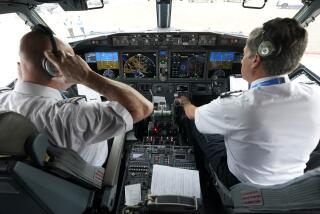10 Additional Controllers Told to Join Drug Plan
- Share via
The Federal Aviation Administration on Friday announced it has completed its investigation of off-duty drug use among controllers at a regional traffic control center by ordering 10 more of them to enter rehabilitation programs or be fired.
That brought to 13 the total number of controllers referred to rehabilitation--more than one-third of the 34 who were investigated.
When the probe began Aug. 21, the controllers were pulled off their radar screens at the Los Angeles Air Route Traffic Center in Palmdale, where about 160 controllers guide all airplanes in and out of dozens of Southland airports once they leave the jurisdiction of local airport control towers. Those under investigation were required to take urinalyses tests and placed on paid “administrative leave” status.
21 Returned to Jobs
The FAA said Friday that all 21 controllers cleared in the investigation have now returned to their normal jobs. In addition, three “non-controller” employees have been cleared of similar accusations while two others have been referred to rehabilitation.
Several of the controllers under investigation had predicted that the agency would be embarrassed when only a few controllers were found to have used drugs.
The fact that substantially more were referred to rehabilitation programs--and implicitly accused of using drugs--brought renewed protests from controllers, who claimed that the FAA had made its decisions on the basis of insufficient evidence.
Kelly Candaele, western states coordinator for the National Air Traffic Controllers Assn., which is trying to unionize the nation’s controllers, said the FAA had failed to prove that many of the 13 controllers referred to rehabilitation had either tested positive on urinalyses tests or admitted using drugs.
Third-Party Statements
In some cases, Candaele charged, the FAA appeared to have based its conclusion on third-party statements by other individuals who said they saw a controller use drugs.
As they have throughout the investigation, FAA representatives declined to answer questions about how the investigation was conducted.
A spokeswoman not only refused to say how many of the 13 controllers had tested positively for drugs, but also refused to say whether the agency relied on third-party allegations of drug use, as opposed to direct admissions by controllers that they had used drugs.
The FAA’s investigation was triggered by an informant who told sheriff’s narcotics investigators in Lancaster that the secretary to the Palmdale center’s manager was involved in cocaine use.
Subsequently, deputies arrested the secretary and FAA officials began to focus on many controllers whose names were found in her address book, according to sources familiar with the investigation.
Alfred Klein, a Los Angeles labor relations attorney who represents management, said “a lot of companies would ignore” third-party evidence in such cases.
If the FAA relied on third-party statements in some cases, Klein said, it may have felt free to do so because the controllers are not represented by a union. (Most of the controllers were hired in 1981, after President Reagan fired most of the nation’s controllers during a labor dispute.)
“Typically, the reliance on a third-party statement is the kind of thing a union would take to arbitration, and an arbitrator might . . . minimize the impact of any discipline, and might even find referring a person to treatment under those circumstances inappropriate if there is no evidence that the person is anything but a recreational user,” Klein said.
The FAA made its first comments on the investigation’s results last week, announcing that it had referred three controllers to drug rehabilitation programs and cleared 15 others.
The accused controllers have 15 days to decide whether to enter rehabilitation programs at their own expense. They may appeal to the federal Merit System Protection Board.
Kathy Heet, a controller who said she was one of the 21 cleared in the investigation, said in an interview Friday that her colleagues are convinced the FAA had no first-hand proof of drug use in many cases.
Alcohol Problem
One of the 13 referred to rehabilitation, Heet said, was a controller whose problem was alcohol. Some others counted among the 13, she said, were controllers whose “rehabilitation” consisted of a quick examination at a local medical center and a warning that they would be subject to periodic urinalysis.
Normal drug rehabilitation programs, which the controllers will pay for out of their own pockets, last weeks and cost thousands of dollars. Controller organizer Candaele said the FAA had set a poor precedent for drug testing in the workplace.
“If the American public wants to let employers conduct these kind of drug-screen policies, they are not going to like what they see, and they are not going to like what they find,” he said.
“The FAA didn’t have to prove anything. All they have to say is ‘We did this investigation and here’s what we came up with.’ ”
More to Read
Inside the business of entertainment
The Wide Shot brings you news, analysis and insights on everything from streaming wars to production — and what it all means for the future.
You may occasionally receive promotional content from the Los Angeles Times.









